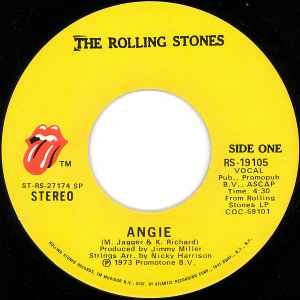April 17, 2020 —– Chart #7
Hello Musical Friends,
Today’s chart of the day (my 7th now) is from The Rolling Stones. It’s a rainy Sunday at my house and this song just seemed to fit the day. From the 1973 Goats Head Soup album, the song is “Angie”.
The song is credited, as most Rolling Stones songs are, to both Mick Jagger and Keith Richards, but it is acknowledged to be almost completely written by Richards. “Angie” was recorded in November and December 1972 and is an acoustic-guitar-driven ballad characterizing the end of a romance. The song’s distinctive piano accompaniment, written by Richards, was played on the album by Nicky Hopkins, a Rolling Stones recording-session regular. The strings on the piece (as well as on another song, “Winter”) were arranged by Nicky Harrison. An unusual feature of the original recording is that singer Mick Jagger’s vocal guide track (made before the final vocals were performed) is faintly audible throughout the song (an effect sometimes called a “ghost vocal”).
Released as a single in August 1973, “Angie” went straight to the top of the US Billboard Hot 100 and reached No. 5 on the UK singles chart. The song was also a No. 1 hit in both Canada and Australia for five weeks each and topped the charts in many countries throughout Europe and the rest of the world. Because of the song’s length, some radio stations made edits to shorten it to 3 minutes, omitting the longer coda and the second instrumental section of the song.
There was speculation that the song was about David Bowie’s first wife Angela, Keith Richards’ newborn daughter Dandelion Angela, the actress Angie Dickinson, and others. In 1993, in an interview for the liner notes to the Rolling Stones’ compilation album Jump Back: The Best of The Rolling Stones, Richards said that the title was inspired by his baby daughter. However, in his 2010 memoir Life, Richards said that he had chosen the name at random when writing the song – before he knew that his baby would be named Angela or even knew that his baby would be a girl – and that the song “was not about any particular person.” According to NME, Jagger’s contributions to the lyrics referred to his breakup with Marianne Faithfull.
Live in 1982 with full Jagger stage panache : https://youtu.be/qa8leK9ejrw
Enjoy,
Stan
